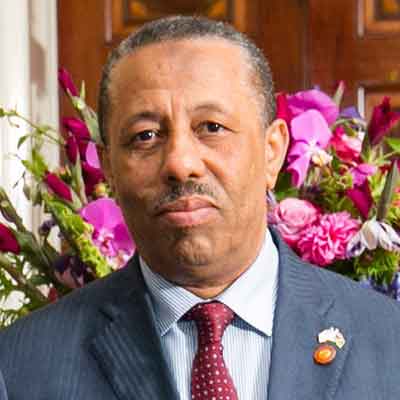 The future of Libya’s internationally recognised government was uncertain Wednesday after Prime Minister Abdullah al-Thani said he would resign, as fraught peace talks entered a second day.
The future of Libya’s internationally recognised government was uncertain Wednesday after Prime Minister Abdullah al-Thani said he would resign, as fraught peace talks entered a second day.
It was unclear whether Thani planned to follow through on his vow, and a government spokesman said the premier had not stepped down.
Thani made the resignation promise during an emotional live television appearance in which he faced a barrage of angry questions from citizens.
The move added to the political chaos in Libya, as the country’s rival factions met for a second day of UN-sponsored peace talks in Geneva.
Thani faced questions in Tuesday’s programme from Libyans blaming his government for the lack of basic services such as electricity and poor security in areas it controls.
“If my exit is the solution, then I announce it here,” Thani said during the talk show. “My resignation will be submitted to the parliament on Sunday.”
Adding to the confusion, government spokesman Hatem el-Ouraybi said Thani’s promise had been conditional.
“The prime minister said during the interview that he would resign if people wanted him to, that’s it,” Ouraybi told AFP.
He said no resignation letter had yet been submitted to parliament. “I don’t now have an answer to the question of whether it will be submitted on Sunday.”
– Ambitious talks timetable –
Libya, which plunged into chaos after the ouster and killing of its leader Moamer Kadhafi in a 2011 revolution, has two rival governments and parliaments vying for power, as well as several militia groups battling for control of its oil wealth.
The country is gripped by unrest with Benghazi, the main city in the east, caught in a daily war between pro- and anti-government forces.
Thani’s government has been working out of a small eastern city near the border with Egypt since an Islamist militia alliance captured the capital Tripoli last year.
The international community recognises the parliament that sits in the eastern port of Tobruk.
A partial peace deal aimed at restoring stability was reached last month, but leaders of the Islamist-backed General National Congress (GNC) parliament that sits in Tripoli boycotted the pact, calling it “unsatisfactory”.
The rival factions started a new round of peace talks in Geneva on Tuesday, with representatives of the Tripoli parliament this time joining the talks.
UN special envoy Bernardino Leon urged the camps to reach a deal on a unity government could enforce a ceasefire.
He laid out an ambitious timetable, calling for a comprehensive agreement before the next UN General Assembly meeting in September, although he warned the process would be difficult.
On Wednesday, representatives of both factions were seen gathering for the talks together in the same room with Leon.
Leon had told reporters Tuesday that he was meeting the two camps separately and hoped to eventually get them in the same room.
– ‘Tension’ over army chief –
Delegates said a key sticking point was the future role of controversial General Khalifa Haftar, installed by the internationally recognised government as its army chief in March.
The 72-year-old Haftar served as a general under Kadhafi before relocating to the United States, where he worked at times with the CIA, according to US media reports.
He returned to Libya last year and took charge of the army, vowing to crush the Islamist militias while urging the West to support his forces.
Naeem Mohamed Abdurrahman al-Gheryani, a former education minister elected to the internationally recognised House of Representatives, said Haftar was clearly “the primary source of tension” at the talks.
“Him stepping aside will help remove a lot of anxiety and I don’t think he is capable of being a being a unifying figure,” Gheryani said.
He dismissed Thani’s resignation vow as inconsequential.
“The objective of these discussions is to form a national unity government, which hopefully will take over in a few months,” he said.
“I don’t think anybody cares about it.”
Thani already threatened to resign in April 2014, less than a month after being named to replace his sacked predecessor, after gunmen attacked his family home in an incident that left no casualties.
In the end he stayed on, and was confirmed in the post by the parliament elected in June 2014.



